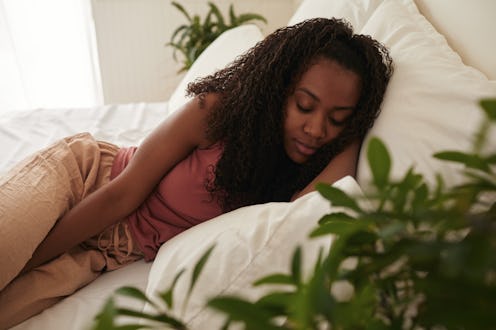Life
If You’re Feeling Weirdly Calm With ~ Everything ~, Experts Say That’s OK

The news is full of advice on how to stay calm during the coronavirus pandemic — but what if, actually, you've been feeling pretty OK? Psychologists say that keeping your cool isn't an inappropriate reaction to what's going on right now, even if you feel like everyone around you is in panicking. People who feel less rattled than they think they should might be reacting in line with their temperament, their experience with previous traumas, and their overall panic levels over time.
"While the impact of coronavirus is global, the reactions are decidedly individual," Dr. Gregory Nawalanic M.D., a clinical psychologist with the University of Kansas Health System, tells Bustle. "There is no specifically 'right' way to respond to a pandemic." A person's reactions to extreme situations tend to moderate over time, and you may feel more relaxed now if you were initially very worried. "The folks who initially panicked trend toward a calmer space of acceptance, in the same way that those who initially dismissed the potential impact will trend toward activated understanding," he says. Or so we hope.
Some people are also inherently calmer than others in the face of threats or anxiety-provoking events. "Everyone has their own innate temperament, how they are wired, so to speak," Dr. Nadia E. Charguia M.D., a psychiatrist with the Department of Psychiatry at University of North Carolina Health, tells Bustle. "We all are on a spectrum when it comes to our character traits," she says.
You may also be finding some aspects of isolation soothing, especially if you're introverted by nature. "The reduced interactions, and not needing to be 'on our top game' socially, can give us a sense of safety, familiarity, and calmness," Dr. Joshua Klapow Ph.D., a clinical psychologist, tells Bustle. "We are reminded that we can be in our pajamas, take off our shoes and sit in our favorite chair." The familiar things in your environment can be really effective in calming you down.
Previous experience with trauma can also make people more chill. "Many people have had prior exposure to highly stressed situations, and as a result, may no longer exhibit a stressed, strained or anxious response," Dr. Charguia says. If any part of this experience feels familiar, you may feel more relaxed about living through it.
That said, some people might be feeling extra calm because they're repressing their anxiety. Dr. Nawalanic says that if you've been feeling oddly detached or unemotional, your anxiety might be manifesting itself in other ways, like mood swings, sleep problems, depression, or strain in your relationships. If you're repressing your feelings about coronavirus, he says, it's likely they might bubble up after the situation is resolved, and you could start feeling really anxious once lockdown is over.
"Those who appear strangely calm in the face of loss and hardship right now might be more in need of mental health support than those who are appropriately acknowledging and expressing their feelings," Dr. Nawalanic says. If you're concerned that your no-worries demeanor is covering up deeper feelings, talk to a supportive person in your life, or try reaching out to a therapist.
If you're feeling pretty OK about things right now, though, try not to stress about it — some people just deal with upheaval in their own, calm way.
If you or someone you know is seeking help for mental health concerns, visit the National Alliance on Mental Illness (NAMI) website, or call 1-800-950-NAMI(6264). For confidential treatment referrals, visit the Substance Abuse and Mental Health Services Administration (SAMHSA) website, or call the National Helpline at 1-800-662-HELP(4357). In an emergency, contact the National Suicide Prevention Lifeline at 1-800-273-TALK(8255) or call 911.
Experts:
Dr. Nadia E. Charguia M.D., psychiatrist
Dr. Joshua Klapow Ph.D., clinical psychologist
Dr. Gregory Nawalanic M.D., clinical psychologist
This article was originally published on